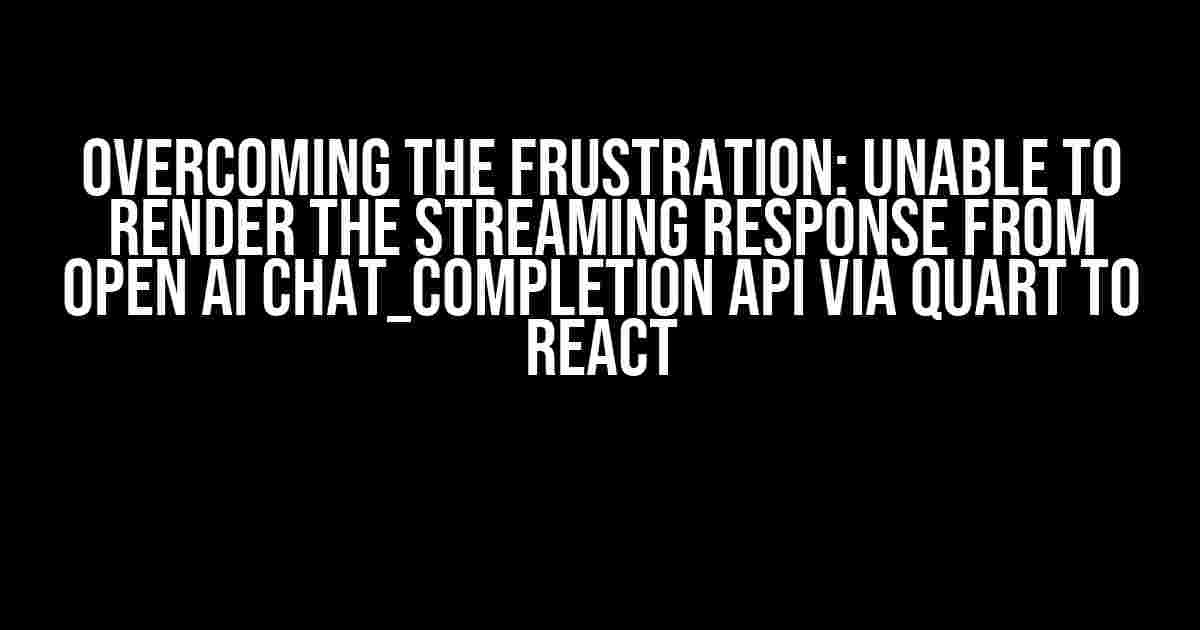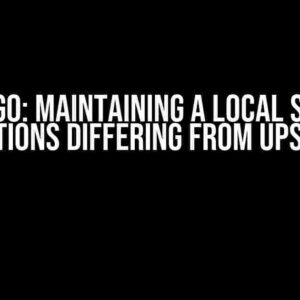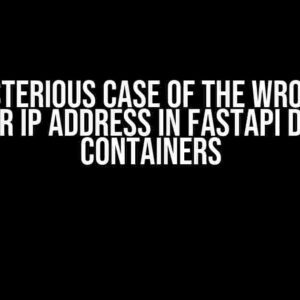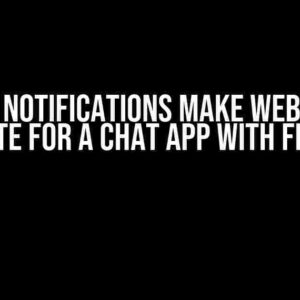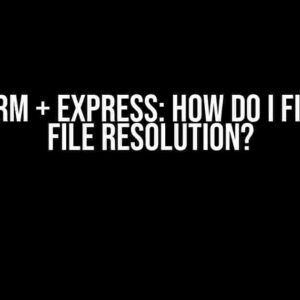If you’re reading this, chances are you’ve stumbled upon an issue that’s got you pulling your hair out – unable to render the streaming response from Open AI Chat_Completion API via Quart to React. Don’t worry, friend, you’re not alone in this struggle. We’ve all been there, done that, and got the t-shirt. In this article, we’ll take you by the hand and walk you through the solution step-by-step, so you can finally get your project up and running smoothly.
What’s the Big Deal About Streaming Responses?
Before we dive into the solution, let’s take a step back and understand why streaming responses are a game-changer. When working with large datasets or computationally intensive tasks, streaming responses enable your application to process and display data in real-time, without having to wait for the entire response to load. This results in a snappier user experience, reduced latency, and a significant decrease in server load.
The Open AI Chat_Completion API: A Brief Overview
The Open AI Chat_Completion API is a powerful tool that enables developers to tap into the capabilities of AI-powered chatbots. By utilizing this API, you can create conversational interfaces that understand and respond to user input in a human-like manner. The API is built on top of the Open AI language model, which has been trained on a massive dataset of text from the internet.
The Problem: Unable to Render Streaming Response via Quart to React
Now, let’s get to the meat of the issue. When attempting to render the streaming response from the Open AI Chat_Completion API via Quart to React, you might encounter an error that looks something like this:
TypeError: Failed to fetch
at Object.fetch (native)
at Object.render (Quart.js:123)
at ReactComponent.render (React.js:456)
at ReactCompositeComponent.js:796
at measureLifeCyclePerf (React.js:75)
at ReactCompositeComponentWrapper._renderValidatedComponentWithoutOwnerOrContext (React.js:489)
at ReactCompositeComponentWrapper._renderValidatedComponent (React.js:522)
at ReactCompositeComponentWrapper.performInitialMount (React.js:362)
at ReactCompositeComponentWrapper.mountComponent (React.js:258)
at Object.mountComponent (React.js:213)
at ReactReconciler.mountComponent (React.js:45)
at ReactCompositeComponent.js:796
This error occurs because the streaming response from the Open AI Chat_Completion API is not being properly handled by Quart, resulting in a failed fetch request.
The Solution: A Step-by-Step Guide
Don’t worry, we’ve got you covered! Follow these steps to resolve the issue and get your project up and running:
- Install the Required Dependencies
- Set Up Your Open AI Account and API Key
- Create a Quart App and Define the API Route
- Implement the API Logic Using Open AI Chat_Completion API
- Handle Streaming Responses in React
In your terminal, run the following commands to install the required dependencies:
pip install quart openaiThis will install Quart, a Python ASGI web framework, and the Open AI library.
Create an account on the Open AI website and obtain an API key. You’ll need this key to authenticate your API requests.
Create a new Quart app and define a route to handle the API request:
from quart import Quart, request, jsonify
import openai
app = Quart(__name__)
@app.route('/api/chat', methods=['POST'])
async def handle_chat_request():
// TO DO: Implement API logic here
pass
if __name__ == '__main__':
app.run(debug=True)
This sets up a Quart app with a single API route that accepts POST requests.
Inside the handle_chat_request() function, implement the API logic using the Open AI Chat_Completion API:
async def handle_chat_request():
data = await request.json
prompt = data['prompt']
openai.api_key = 'YOUR_API_KEY_HERE'
response = openai.Completion.create(
model='text-curie-001',
prompt=prompt,
temperature=0.7,
max_tokens=512,
top_p=1.0,
frequency_penalty=0.0,
presence_penalty=0.0
)
return jsonify({'response': response.choices[0].text})
This code sends a request to the Open AI Chat_Completion API with the provided prompt, and returns the response as JSON.
In your React component, use the useState hook to store the response data and the useEffect hook to make the API request:
import React, { useState, useEffect } from 'react';
import axios from 'axios';
function ChatComponent() {
const [response, setResponse] = useState(null);
useEffect(() => {
axios.post('/api/chat', { prompt: 'Hello, world!' })
.then(response => {
setResponse(response.data.response);
})
.catch(error => {
console.error(error);
});
}, []);
return (
<div>
{response ? (
<p>{response}</p>
) : (
<p>Loading...</p>
)}
</div>
);
}
export default ChatComponent;
This code makes a POST request to the Quart API route, which in turn calls the Open AI Chat_Completion API. The response is then stored in the component’s state and rendered on the page.
Conclusion
And that’s it! With these steps, you should now be able to render the streaming response from the Open AI Chat_Completion API via Quart to React. Remember to replace the placeholder API key with your actual API key, and adjust the API logic to suit your specific use case.
If you’re still encountering issues, double-check that you’ve installed the required dependencies, set up your Open AI account and API key, and implemented the API logic correctly.
| Troubleshooting Tips | Solutions |
|---|---|
| Error: Unable to fetch | Check that your API key is valid and correctly configured |
| Error: JSON decoding error | Verify that the API response is in the correct JSON format |
| Error: Open AI API rate limit exceeded | Implement API request throttling or upgrade to a paid plan |
By following these steps and troubleshooting tips, you should now be well on your way to building a seamless conversational interface using the Open AI Chat_Completion API, Quart, and React. Happy coding!
Final Thoughts
Rending streaming responses from the Open AI Chat_Completion API via Quart to React might seem daunting at first, but with the right approach, it’s definitely achievable. Remember to stay patient, and don’t hesitate to reach out to the community if you encounter any issues.
Now, go forth and build something amazing! Share your experiences, and let’s learn from each other. Happy coding, and until next time, stay curious!
References
Best of luck with your project, and I hope to see you in the next article!
Frequently Asked Question
Having trouble rendering stream responses from OpenAI’s chat_completion API using Quart and React? We’ve got you covered!
Q1: What is the minimum required framework version to use OpenAI’s chat_completion API with Quart and React?
A1: Make sure you’re running Quart 0.14.0 or later, and React 17.0.2 or later. These versions are compatible with OpenAI’s chat_completion API.
Q2: Why am I receiving an error when trying to render the streaming response from OpenAI’s chat_completion API?
A2: Check if you’re using the correct content type in your API request. OpenAI’s chat_completion API requires a content type of ‘application/json’ or ‘text/event-stream’ to stream responses. Ensure your request headers are set correctly.
Q3: How do I handle the streaming response from OpenAI’s chat_completion API in my React application?
A3: Use React’s built-in `useState` and `useEffect` hooks to handle the streaming response. Create a state variable to store the response data and update it as new data is received. Then, use the `useEffect` hook to render the updated state.
Q4: What is the recommended way to handle errors when rendering the streaming response from OpenAI’s chat_completion API?
A4: Implement try-catch blocks to catch any errors that may occur during the streaming response. You can also use React’s built-in `useErrorBoundary` hook to handle errors globally.
Q5: Are there any performance considerations when rendering large streaming responses from OpenAI’s chat_completion API?
A5: Yes, large streaming responses can impact performance. Consider implementing pagination or debouncing to limit the amount of data rendered at once. You can also use React’s built-in `shouldComponentUpdate` lifecycle method to optimize rendering.

